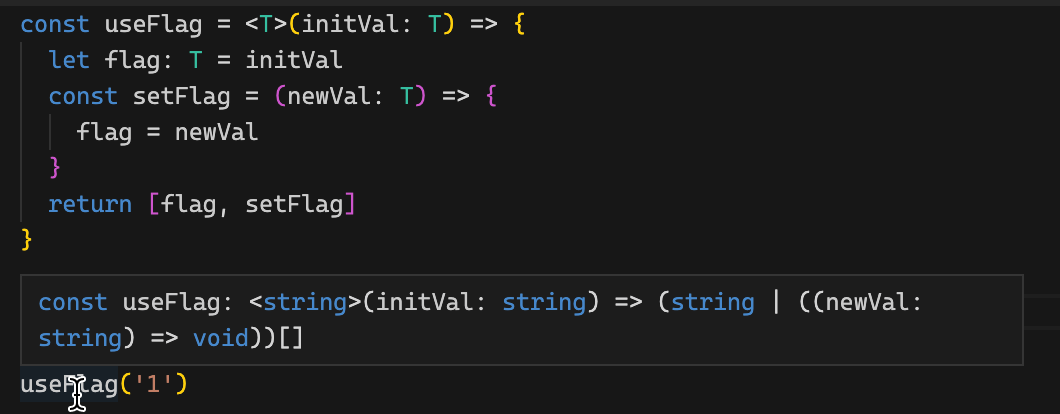TS 常量相关
TODO:
as const 常量断言
// 因为 const 常量不会变 因此 ts 直接推断为 'immutableString'
const immutableString = 'immutableString';
// 因为let 变量会变 因此 ts 变宽推断为 string
let mutableString = 'mutableString';- 因为
const常量不会变,因此TS直接推断为'immutableString' - 因为
let变量会变,因此TS变宽推断为string
而对象/数组 项则都可变 TS 推断是宽的
这么理解后,我们再来看看这个语句 👇
const A = ['1', '2']
// type A -> string[]
type Test = typeof A[number]
// type Test -> string
const A = ['1', '2'] as const
// type A -> readonly ['1', '2']
type Test = typeof A[number]
// ✨ type Test -> '1' | '2'有了 as const 后更方便我们使用 数据[xx] 取出具体的 ✨常量,而不是类型!
常见 use 工具方法使用 as const
const useFlag = <T>(initVal: T) => {
let flag: T = initVal
const setFlag = (newVal: T) => flag = newVal
return [flag, setFlag]
}
useFlag('1')👇 TS 推断结果

👆 useFlag() 返回的类型推断为 (string | ((newVal: string) => void ))[]
这样也是符合语义的: [flag, setFlag, flag, flag] 这种类型
而当我们明确知道这个数组只有2项: 值 和 set方法, 因此可以明确告诉 TS 返回值是元组
解决:
const useFlag = <T>(initVal: T): [T, (newVal: T)=>void] => {}👆 1. 手动定义 useFlag 函数的返回类型:[T, (newVal: T)=>void]
const useFlag = <T>(initVal: T)=> {
// ...
return [flag, setFlag] as [typeof flag, typeof setFlag]
}👆 2. 手动定义函数内部 return 的数据类型:[typeof flag, typeof setFlag]
分析:
其实从语义层面来分析,TS 之所以没能将返回值推断为元组类型是因为它认为该返回值仍有可能被 push 值/被修改
👇 所以我们真正需要做的是告诉 TS,这个返回值是一个 final ,其本身和属性都是不可篡改的,而这正是常量断言 as const 所做的事
const useFlag = <T>(initVal: T)=> {
// ...
return [flag, setFlag] as const
}👇 TS 推断结果

返回的类型推断为 readonly [string, (newVal: string) => void ]
数组项常量转类型
const APP = ['a', 'b', 'c'];数组数据 转为 联合类型 👇
type app = 'a' | 'b' | 'c';步骤:
- 使用
as const将数据数组变为readonly的 元组 类型 APP是数据,因此要用typeof-->readonly ['a', 'b', 'c']readonly ['a', 'b', 'c']类型的[number]-->'a' | 'b' | 'c'
const APP = ['a', 'b', 'c'] as const;
type app = typeof APP[number];
// type app -> readonly 'a' | 'b' | 'c'
function getIt(app: app) {}
getIt('a'); // ok
getIt('whatever'); // ❌ not ok👆 TS 校验枚举 发生在编译时,运行时不校验
对象数据常量转类型
👇 数据转联合类型
const CODE_MAP = {
A: '123',
B: '124',
} as const;
// '123' | '124'
type code = typeof CODE_MAP[keyof typeof CODE_MAP]取 value 而不是取 key 因此要用 数据[key]
👇 使用泛型抽象
type ValueOf<T> = T[keyof T];
// '123' | '124'
const code: ValueOf<typeof CODE_MAP>取 value 而不是取 key 因此要用 数据[key]
👇 数据转联合类型
interface Item {
label: string;
value: string
}
const A_LIST = [
{ label: '中文A', value: '123' },
{ label: '中文B', value: '124' }
] as const
// ✨ 泛型抽象
type ValueOf<T extends Readonly<Item[]>> = T[number]['value']
type Code = ValueOf<typeof A_LIST>
// '123' | '124'
const code: Codeenum 枚举的运行时代码
enum A {
a = '1'
}
enum A {
b = '1'
}
// 👇
var A;
// ✨ 合并重复的 enum 声明
(function (A) {
A["a"] = "1";
})(A || (A = {}));
(function (A) {
A["b"] = "1";
})(A || (A = {}));立即执行的参数,用于合并重复的 enum 声明
👇 值是数字时,有 反向映射 的运行时代码
enum A {
a = 1
}
(function (A) {
A[A["a"] = 1] = "a"; // ✨ 反向映射 { a: 1, 1: a }
})(A || (A = {}));enum 维护常量
interface ListItem {
label: string
value: string
}
enum CODE_ENUM {
codeA = '中文A',
codeB = '中文B',
}
type CodeType = keyof typeof CODE_ENUM // 'codeA' | 'codeA'
// enum {code: 'label'} --> [{ label:'中文', value:'code' }]
function enumToList(codeEnum: { [key in string]: string }) {
const arr: ListItem[] = []
Object.keys(codeEnum).forEach(item => {
arr.push({ label: codeEnum[item], value: item })
})
return arr
}
const list: ListItem[] = enumToList(CODE_ENUM)
const item: CodeType = 'codeA'
const currentLabel = CODE_ENUM[item]🤔 但是,当涉及中文时,不确定会不会有什么中文编码的问题导致 key 的索引问题
因此在不考虑中文作 enum 枚举 key 的前提下
enum 的 key 也不能是数字/数字字符串:enum { '2' = 'xxx' } 不能通过 tsc 编译
code 枚举是 数字和中文 的场景又很常见
维护常量实际场景
interface SelectItem {
label: string
value: string | number
}
// 编写一个工具类型:从联合类型中找到想要的某一类型,并提取相应属性 label 的值
type ExtractValue<T, K> = T extends { value: K; label: infer R } ? R : never
const genMapObject = <T extends Readonly<SelectItem[]>>(originData: T) => {
const codeLabelObj: {
[K in T[number]['value']]: ExtractValue<T[number], K>
} = Object.create(null)
originData.forEach(item => {
// ;(codeLabelObj as any)[item.value] = item.value
codeLabelObj[item.value as T[number]['value']] = item.label as ExtractValue<T[number], T[number]['value']>
})
return codeLabelObj
}
const A_LIST = [
{ label: '中文A', value: '123' },
{ label: '中文B', value: '124' },
] as const
export const A_OBJECT = genMapObject(A_LIST)
export type T_A_TYPE = keyof typeof A_OBJEC
// page.ts
const t: T_A_TYPE = '123'
const currentFruit = A_OBJECT[t] // '中文A'